Heartland Magazine, Fairbanks Daily-News Miner, Fairbanks, Alaska, October 3, 2004
Language arts.
Where there's a word, there's a way at International Academy.
Story and photos by SHANA LOSHBAUGH
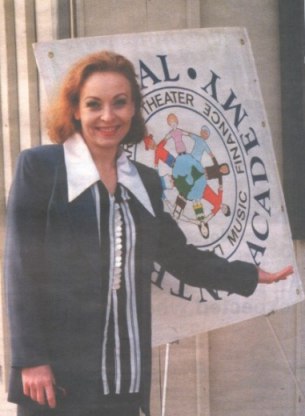 Russian-born linguist and educator Svetlana V. Nuss opened the
International Academy last year in Fairbanks and Anchorage. Before coming to the
United States, she worked as a university professor specializing in the best
ways to teach foreign languages.
Russian-born linguist and educator Svetlana V. Nuss opened the
International Academy last year in Fairbanks and Anchorage. Before coming to the
United States, she worked as a university professor specializing in the best
ways to teach foreign languages.
|
"I was just amazed at how little people knew about foreign
languages and how good they are for children's minds." Svetlana Nuss, Academy
director.
"Rot, nos, ushi ee glaza," a little girl sang shyly, touching part of her face.
The tune was familiar as "Head and shoulders, knees and toes," She was not
making up nonsense words: She was singing a version in Russian, and learning a
new language as part of the game.
Combining languages, learning and fun is the mission at the International
Academy of Fairbanks.
The private school opened its doors a year ago and began its second year of
classes September 18. It offers Arabic, Chinese, French, German, Japanese, Korean,
Russian and Spanish, also conducts classes in Anchorage and is the only Alaska
institution offering so many languages to children as young as 3 years old.
A week before fall classes began, director Svetlana Nuss and several of her
teachers hosted an open house. Families came for a variety of reasons. They
included newcomers from California whose son had just returned frоm Japan, a
couple with an adopted child frоm Russia and an immigrant grandmother hoping to
pass her German heritage on to the new generation.
Some present attended the academy last year and were enthusiastic about signing
up for the next session.
Maria Giannetto, 12, and her mother, Anna, took the adult Korean course together
last year. They found it a real challenge compared to their earlier work on French,
but plan to keep working on it.
"It's hard," Maria said of the language.
The teacher drilled them, writing the new alphabet on the chalkboard, and
explained how Koreans assemble symbols and roots into words quite differently
than in European languages, she said.
Anna had investigated language courses available elsewhere, but found the
offerings limited and too dry to keep young students' attention.
When she first heard about the academy, she was skeptical. But now she praises
it highly.
"They are very user-friendly," she said. "It's almost like one-on-one because
the classes are so small. And it's a really relaxed, fun atmosphere."
 Danielle Rathbun, 12, sounds out Russian syllables using her teacher's "magic wand."
Rathbun is a second-year language student at the International Academy of Fairbanks.
Instructor Yuliya Kermes uses this homemade chart of Russian syllables to coach
her students to pronounce the language correctly.
Danielle Rathbun, 12, sounds out Russian syllables using her teacher's "magic wand."
Rathbun is a second-year language student at the International Academy of Fairbanks.
Instructor Yuliya Kermes uses this homemade chart of Russian syllables to coach
her students to pronounce the language correctly.
|
The Rathbun family is equally enthusiastic. Danielle, 12, and Joshua, 10, started
Russian last year because their grandparents are working in Siberia as missionaries.
They described how they watched Russian movies, made cards for the Russian holiday
Women's Day, read a translation of "Masha and the Three Bears" and learned to
count while playing ball games.
"I learned a lot," Danielle said. "The sentences are kind of weird.
Instead of 'I love you,' it's 'I you love.'"
"I want us all to go to Russia some day," Danielle and Joshua's mother, Debbie, said.
She grew up in a family of linguists and is delighted her children can learn
a second tongue.
"It really enriches your life," she said.
The academy is the brainchild and labor of love of Svetlana Nuss, a Russian
immigrant who wanted her own children to experience the best of both Russian and
American school systems.
While many educational opportunities available to Alaska families impress her,
Nuss said she was dismayed to discover that language instruction is relegated to
the teen years and tight budgets have limited arts opportunities. She remembered
her own childhood, when Soviet school days were full of foreign words, dancing,
visual arts, music and special projects such as puppet theater.
If such instruction was not available in Fairbanks, she resolved to provide it
herself. She knew she was uniquely qualified to tackle the formidable task.
Nuss came frоm a family of teachers and always knew she wanted to be one, too.
"When I was growing up, I knew exactly what I was doing," she said. "Every doll
was graded."
Attending university years later, she became fascinated by linguistics, including
problems of how best to teach foreign language skills. While teaching adults at a linguistics university at Pyatigorsk, in the Caucasus region near war-torn Chechnya and working on a doctoral thesis, she took on a summer job as an English translator on a Siberian oil spill.
Among the foreigners she met was Alaska computer specialist Keith Nuss. A
long-distance romance followed. She dismayed her colleagues and surprised herself
by dumping a plum new job as the chair of her university's foreign language department
to run off to America and marry Keith.
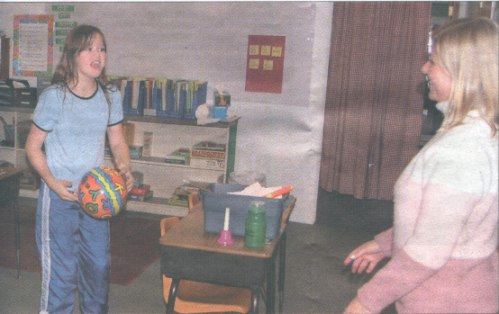
Amanda Welton, plays a ball game with Russian language teacher Yuliya Kermes.
|
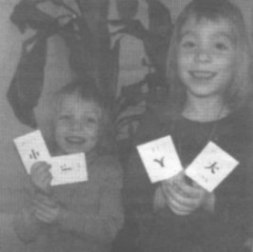
Christina and Mariya Nuss hold up flash cards of Chinese characters. The sisters,
5 and 7, are the daughters of the International Academy director Svetlana Nuss.
|
Her new life was a total departure from her past. Her husband relocated frоm
Valdez to Fairbanks, where he works for VECO. Nuss found herself an American
housewife with two small children, a tight budget and fabulous professional
credentials not transferable to the United States.
She ended up selling Mary Kay cosmetics. Her Russian family was horrified. She
had no background in either cosmetics or sales.
"I knew nothing about sales. But I'm a good student," she said. "A few months
after I started the business I had a free car."
When her elder daughter reached school age, she phased out the successful
cosmetics business. It provided seed money for the school.
And more.
Combined with her teaching expertise, the entrepreneurial savvy she gained in
cosmetic sales made the start-up of a school feasible.
She began talking to parents and found a real demand for language studies.
Immigrants were distressed that their children didn't speak the language of
their grandparents; American-born families wanted to broaden their children's
educational horizons or explore ethnic heritage; home-school families were looking
for community resources.
She also found ignorance.
"I was just amazed at how little people knew about foreign languages and
how good they are for children's minds," she said.
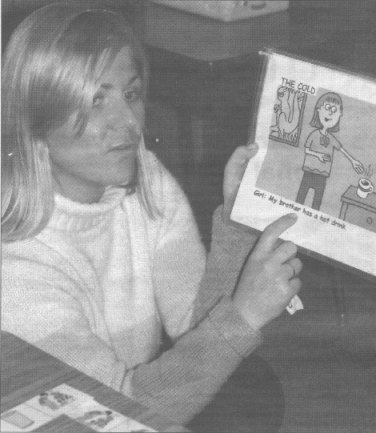
Instructor Yuliya Kermes helps her students translate simple stories in English
into spoken Russian. Like other teachers at the International Academy, she is a
native speaker and emphasizes correct pronunciation.
|
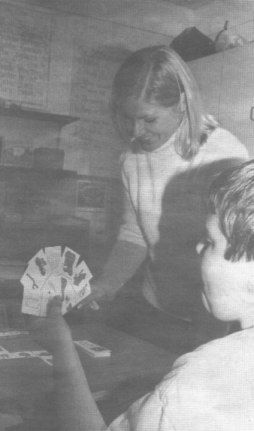
Zack Welton, 11, checks out his hand in a game of dominos while teacher Yuliya
Kermes sets up the rest of the language game for the second-year Russian class.
|
Nuss presented seminars on the benefits of foreign-language instruction and
spread the word.
"It's not just for traveling," she emphasized.
She compare knowing a foreign language to knowing how to drive a car. You can
live without it, but it makes a huge difference in how easily you can get around
and how far you can go.
She cited numerous studies and news reports showing that most children can
readily learn multiple languages and that such multilingualism enhances both
educational achievement and economic opportunities. People who add foreign language
proficiency to other skills get a huge boost in the job market. Unfilled needs
exist for multilingual workers in everything frоm translating Hollywood movies
to national security, she said.
Reaching out to potential clients, her next steps were to find teachers and
a site.
Finding teachers was easy. Fairbanks area residents include many educated and
motivated people frоm abroad. Some were top-notch teachers in their countries of
origin, stymied frоm teaching in Alaska because of problems transferring credentials.
Her Anchorage Arabic teacher, for example, worked as a flight instructor in
Egypt. But in the United States he drives a school bus because he lacks the licenses
to pursue his former career.
The Fairbanks school now has 13 teachers; 10 teach languages.
She found a serendipitous solution to the space problem when she stopped by
the private, nondenominational Lighthouse Community Christian School off College
Road. Principal Birgit Meany was sympathetic and had space. They worked out an
agreement whereby the International Academy uses the religious school's classrooms
after hours and during weekdays and shares costs for support staff.
"It worked out for both parties quite well," Meany said.
Lack of appropriate curriculum materials proved an unexpected problem.
Most foreign-language or bilingual materials available are geared for older
children of assume a familiarity (that may not exist) with another culture.
Nuss cited the example of Mexican fiestas. "I still don't know exactly what
'fiesta' is. Maybe I have to go there and experience it," she said.
She and her staff tackled the teaching-materials gap the same way they tool
on other challenges. They have created their own materials, translating stories
familiar to young Alaskans into other languages and making tapes.
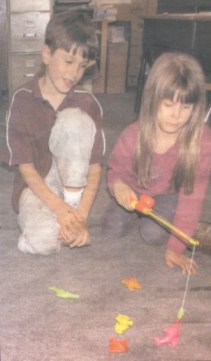 A simple fishing game becomes a fun way to review Russian words for colors and
fishing. Second-year students Lincoln McCready, 9, and his sister Emma McCready,
5, try their luck.
A simple fishing game becomes a fun way to review Russian words for colors and
fishing. Second-year students Lincoln McCready, 9, and his sister Emma McCready,
5, try their luck.
|
Last year, the school started with 70 students. The classes, scheduled for the
participants' convenience, met once a week for sessions lasting 45 minutes to an hour.
Nuss is particular about the lesson plans. They relay upon scientifically
based methods she learned in Russian pedagogical training.
"I know how it needs to be done and what works. This is what I was trained for,"
she said.
"They speak frоm the very first class."
The youngsters play games and take part in carefully scripted activities
designed to involve all their senses, focus their minds in a manner that mimics
the way youngsters learn their first language. The emphasis in on intense concentration;
distractions are discouraged.
The approach is hard work for the teachers. Not only must they hew to the script,
they also must choreograph all the action around them, keep a fast pace and charm
the children. When classes end, they are tired.
"Really, they are actors," Nuss said.
To accelerate learning, students may take a second session, called Culture
Club, designed to increase exposure to the language in a less formal, more
activity-oriented atmosphere.
As the International Academy developed, Nuss set up summer sessions and added
classes in visual arts, music theory, international dance, puppet theater,
movie-making and children's introduction to finances.
This year, she plans to teach most of the Russian classes herself. She thrives
on the work, radiating energy and enthusiasm. She says she tries to balance the
frenetic pace at the point that it provides her with just enough challenge to
keep her on the run without frustration.
She admitted, with laugh, that selling cosmetics was far more lucrative. But
this is the career she loves.
But, even more than that, she is doing it to provide her daughters, now 5 and
7, with the kind of education she believes is best for them. She said she uses
them as "guinea pigs" and adds subjects primarily because she wants them for her
own family.
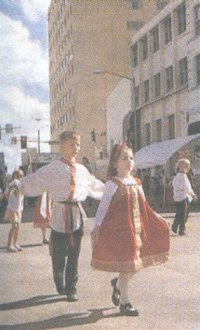
Vladimir Kulchitskiy, 7, and Kally Maddox, 4, performed at a Fairbanks street
fair downtown this past summer. Their Russian dance was part of the Dances of
the World class held at the International Academy. In addition to language
instruction, the academy offers classes in arts and even finances for children.
Photo courtesy of International Academy.
|
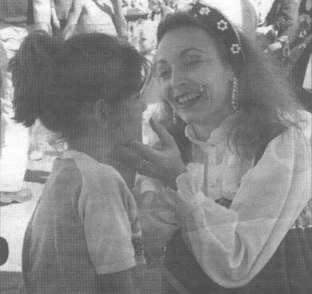
International Academy Director Svetlana Nuss, dressed in traditional Russian
costume, speaks with a potential student at a downtown street fair during the
summer. Photo courtesy of International Academy.
|
"This school takes all the energy out of me, but it makes me a happy mom,"
she said.
This coming Saturday is "Visit a Class Day" at the International Academy.
Visitors are invited to see and participate in the academy's interactive classes
on world languages and culture. 1524 Westwood Way. Call 458-9313 to sign up.
Writer Shana Loshbaugh lives hear Fairbanks.
Heartland Magazine, Fairbanks Daily-News Miner, Fairbanks, Alaska, October 3, 2004
What do you think? Forum Russia-Alaska
Back to English page
Russian page Russia-Alaska
Back Home Russia-Alaska
Eve's Essays
 Russian-born linguist and educator Svetlana V. Nuss opened the
International Academy last year in Fairbanks and Anchorage. Before coming to the
United States, she worked as a university professor specializing in the best
ways to teach foreign languages.
Russian-born linguist and educator Svetlana V. Nuss opened the
International Academy last year in Fairbanks and Anchorage. Before coming to the
United States, she worked as a university professor specializing in the best
ways to teach foreign languages.
 Danielle Rathbun, 12, sounds out Russian syllables using her teacher's "magic wand."
Rathbun is a second-year language student at the International Academy of Fairbanks.
Instructor Yuliya Kermes uses this homemade chart of Russian syllables to coach
her students to pronounce the language correctly.
Danielle Rathbun, 12, sounds out Russian syllables using her teacher's "magic wand."
Rathbun is a second-year language student at the International Academy of Fairbanks.
Instructor Yuliya Kermes uses this homemade chart of Russian syllables to coach
her students to pronounce the language correctly.




 A simple fishing game becomes a fun way to review Russian words for colors and
fishing. Second-year students Lincoln McCready, 9, and his sister Emma McCready,
5, try their luck.
A simple fishing game becomes a fun way to review Russian words for colors and
fishing. Second-year students Lincoln McCready, 9, and his sister Emma McCready,
5, try their luck.

